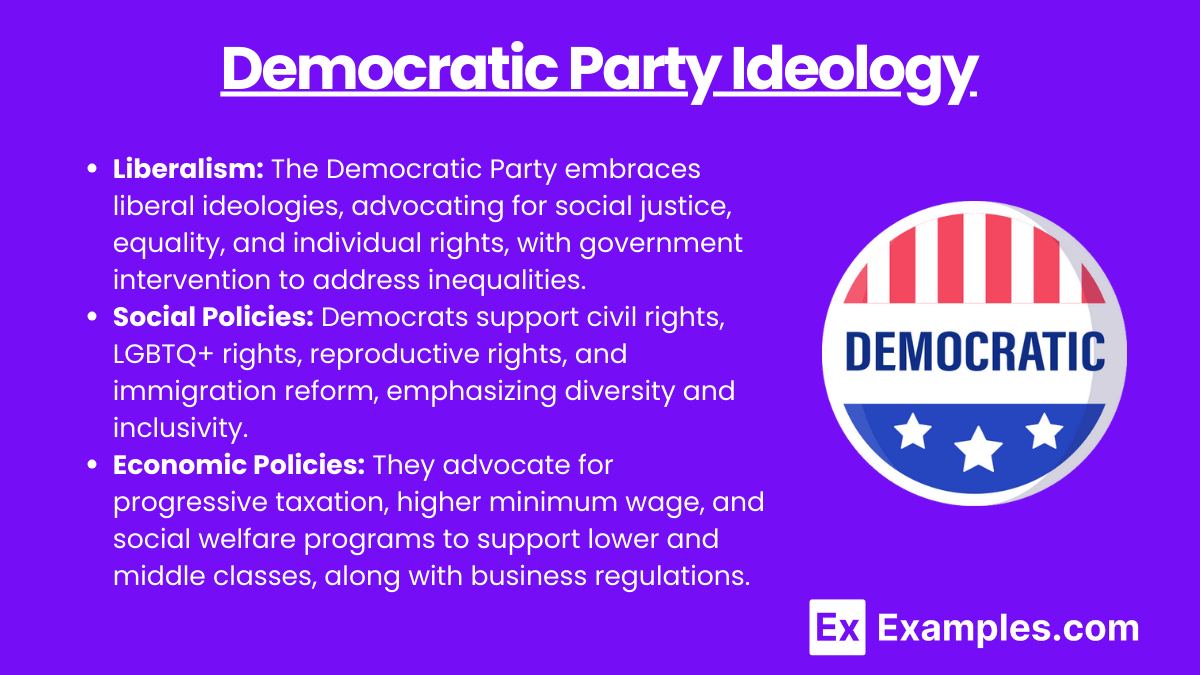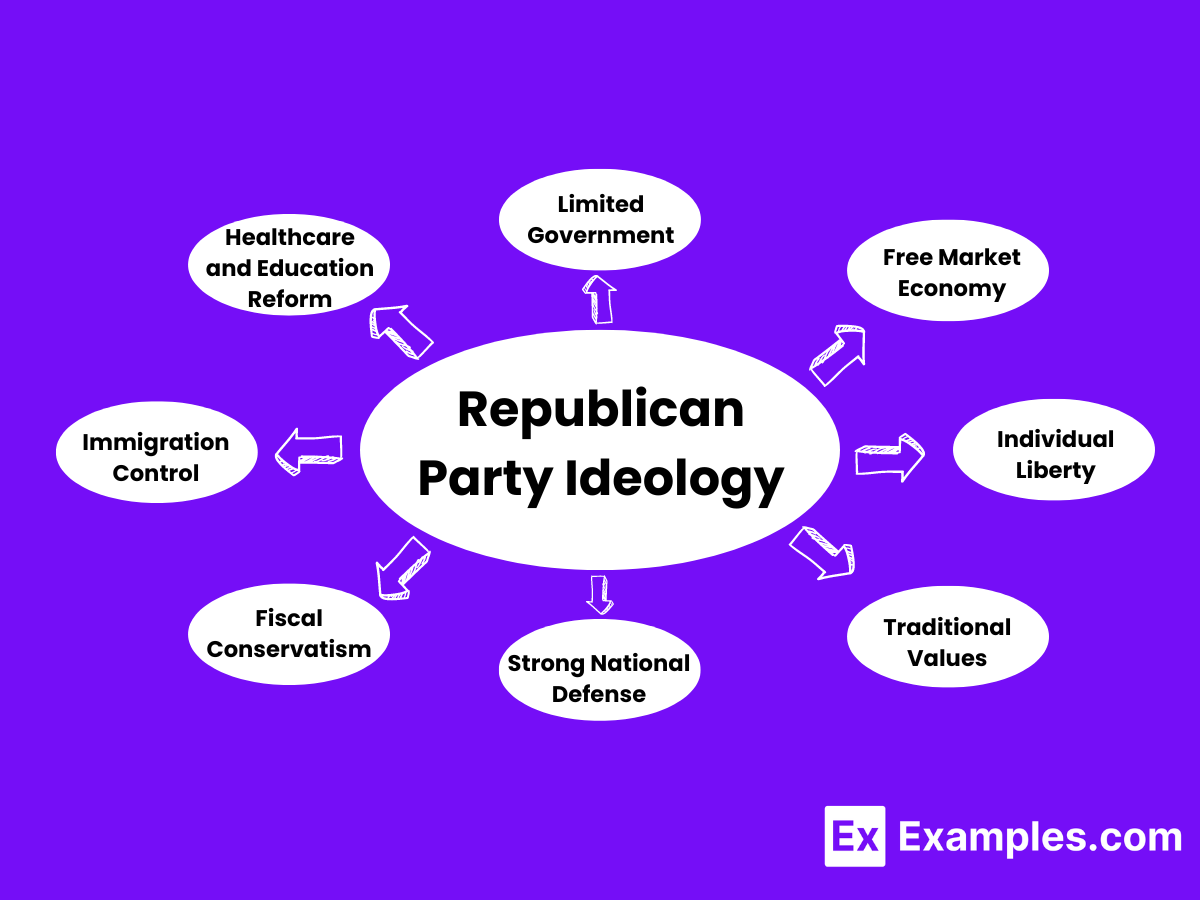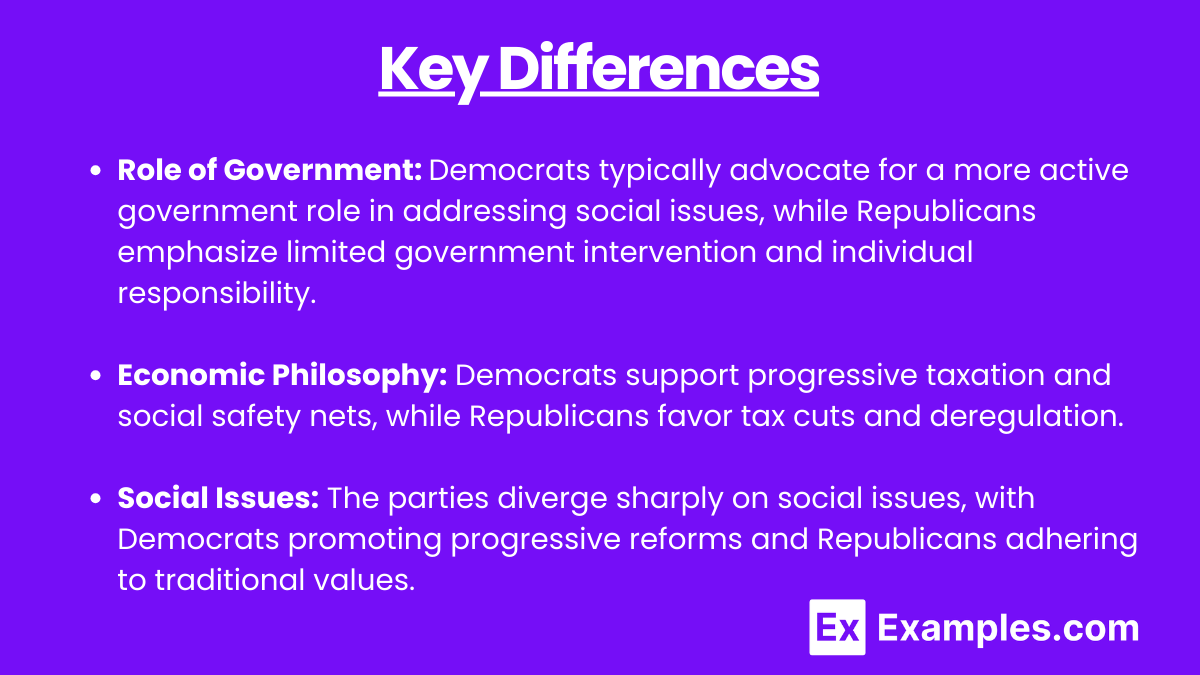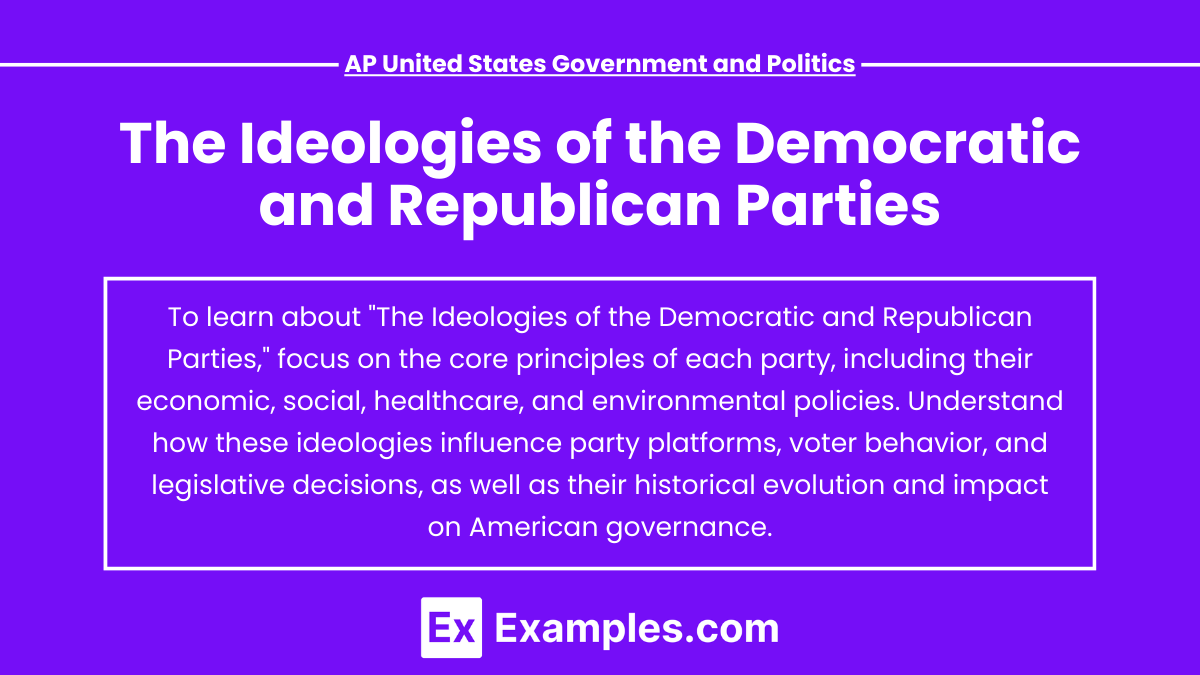The ideologies of the Democratic and Republican parties form the foundation of American political discourse, influencing policies and shaping voter preferences. The Democratic Party generally embraces liberal values, advocating for social justice, equality, and government intervention in the economy. In contrast, the Republican Party tends to uphold conservative principles, emphasizing limited government, individual liberties, and free-market economics. Understanding these ideological differences is crucial for analyzing contemporary political debates, electoral strategies, and the broader implications for governance in the United States.
Free AP United States Government and Politics Practice Test
Learning Objectives
In studying "The Ideologies of the Democratic and Republican Parties" for the AP United States Government and Politics exam, students should learn to identify the core principles and beliefs that define each party's ideology. This includes understanding the key economic, social, healthcare, climate, and education policies promoted by both parties. Students will analyze how these ideologies shape party platforms, influence voter behavior, and impact legislative decisions. Additionally, they will explore the historical context of these ideologies and how they evolve over time, as well as the role of third parties and independent voters in the political landscape.
The ideologies of the Democratic and Republican parties is crucial for analyzing the American political landscape. Each party has distinct principles and beliefs that shape their policies and appeal to different segments of the electorate.
1. Democratic Party Ideology

Liberalism: The Democratic Party generally embraces liberal ideologies, advocating for social justice, equality, and individual rights. Democrats tend to support government intervention in the economy to address social inequalities and provide public services.
Social Policies: Democrats champion civil rights, LGBTQ+ rights, reproductive rights, and immigration reform. They often emphasize the importance of diversity and inclusivity in society.
Economic Policies: The party supports progressive taxation, increased minimum wage, and social welfare programs to aid the lower and middle classes. They advocate for regulations on businesses to protect consumers and the environment.
Healthcare and Education: Democrats typically push for universal healthcare access, often supporting initiatives like the Affordable Care Act. They favor public funding for education and policies aimed at reducing student debt.
2. Republican Party Ideology

The Republican Party, one of the two major political parties in the United States, has a distinct ideology characterized by several key principles:
Limited Government: Republicans generally advocate for a smaller federal government, emphasizing states' rights and local control. They believe that less government intervention allows for more individual freedom and economic growth.
Free Market Economy: The party supports free-market capitalism, promoting policies that encourage entrepreneurship, competition, and minimal regulation. Republicans argue that a free economy fosters innovation and job creation.
Individual Liberty: The ideology emphasizes personal responsibility and individual rights. Republicans advocate for the protection of civil liberties, including Second Amendment rights and freedom of speech, while promoting policies that they believe enhance personal responsibility.
Traditional Values: Many Republicans align with conservative social values, often drawing from religious principles. This includes opposition to abortion, support for traditional marriage, and advocacy for family values.
Strong National Defense: The party typically prioritizes a robust military and national security. Republicans advocate for increased defense spending and a proactive foreign policy to protect U.S. interests globally.
Fiscal Conservatism: Republicans often emphasize the importance of balanced budgets, reduced government spending, and lower taxes. They argue that fiscal responsibility leads to economic stability and growth.
Immigration Control: The party generally supports stricter immigration policies and border security measures. Republicans advocate for legal immigration processes while opposing illegal immigration.
Healthcare and Education Reform: Many Republicans favor market-based solutions for healthcare and education, advocating for competition and choice rather than government-run programs.
3. Key Differences

Role of Government: Democrats typically advocate for a more active government role in addressing social issues, while Republicans emphasize limited government intervention and individual responsibility.
Economic Philosophy: Democrats support progressive taxation and social safety nets, while Republicans favor tax cuts and deregulation.
Social Issues: The parties diverge sharply on social issues, with Democrats promoting progressive reforms and Republicans adhering to traditional values.
Examples
Example 1 : Economic Policy
The Democratic Party supports progressive taxation, aiming to redistribute wealth to address income inequality. They advocate for higher taxes on the wealthy to fund social programs like healthcare and education. In contrast, the Republican Party favors lower taxes for individuals and businesses, believing that tax cuts stimulate economic growth and job creation. They argue that a free market, with minimal government intervention, leads to prosperity.
Example 2 : Social Issues
Democrats emphasize civil rights and social justice, advocating for policies that promote equality for marginalized groups, including LGBTQ+ rights, reproductive rights, and racial justice. They support comprehensive immigration reform that includes a pathway to citizenship for undocumented immigrants. Republicans, however, often prioritize traditional family values, opposing abortion and advocating for stricter immigration enforcement. They emphasize personal responsibility and may resist expansive social reforms.
Example 3 : Healthcare
Democrats typically support universal healthcare access, viewing it as a fundamental right. They champion initiatives like the Affordable Care Act, which aims to expand coverage and reduce costs. The party often seeks to implement public options to enhance accessibility. In contrast, Republicans generally oppose government-run healthcare systems, advocating for market-based solutions. They support policies that emphasize health savings accounts and competition among private insurers to reduce costs.
Example 4 : Climate Change and Environmental Policy
The Democratic Party acknowledges climate change as a critical issue and advocates for policies aimed at reducing carbon emissions and transitioning to renewable energy sources. They support international agreements like the Paris Accord and investment in green technologies. Republicans often express skepticism about climate change policies, emphasizing economic growth over environmental regulations. They advocate for energy independence through fossil fuels and may resist regulations that they believe hinder economic development.
Example 5 : Education
Democrats advocate for increased public funding for education, supporting universal pre-K, reduced student debt, and accessible higher education. They believe that education is a key to social mobility and economic opportunity. Republicans promote school choice initiatives, including charter schools and vouchers, allowing parents to select educational options for their children. They argue that competition among schools leads to better educational outcomes and efficiency in the education system.
Multiple Choice Questions
Question 1
Which of the following policies is most closely associated with the Democratic Party?
A) Lowering taxes for corporations
B) Expanding access to universal healthcare
C) Promoting school choice through vouchers
D) Reducing regulations on businesses
Correct Answer: B) Expanding access to universal healthcare
Explanation: The Democratic Party typically advocates for expanding access to universal healthcare, viewing it as a fundamental right. Initiatives like the Affordable Care Act reflect this ideology. In contrast, Republicans generally favor market-based healthcare solutions and may oppose government-run systems.
Question 2
What is a primary belief of the Republican Party regarding economic policy?
A) Higher taxes on the wealthy to fund social programs
B) Increased government intervention in the economy
C) Lower taxes and reduced regulation to stimulate growth
D) Comprehensive immigration reform with a pathway to citizenship
Correct Answer: C) Lower taxes and reduced regulation to stimulate growth
Explanation: The Republican Party emphasizes lower taxes for individuals and businesses as a means to stimulate economic growth. They argue that reducing regulations fosters a free-market environment, encouraging investment and job creation, which contrasts with the Democratic approach of higher taxes on the wealthy for funding social programs.
Question 3
Which social issue is more likely to be prioritized by the Democratic Party?
A) Stricter immigration enforcement
B) Traditional family values
C) LGBTQ+ rights and protections
D) Tax cuts for individuals
Correct Answer: C) LGBTQ+ rights and protections
Explanation: The Democratic Party prioritizes civil rights and social justice, advocating for policies that support LGBTQ+ rights and protections. In contrast, Republicans often emphasize traditional family values and may take positions that oppose expansive rights for LGBTQ+ individuals, focusing more on preserving what they view as conventional social structures.


